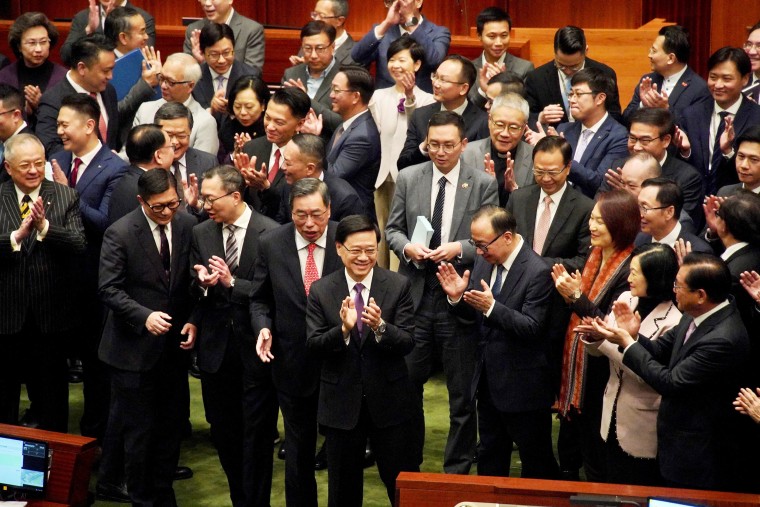Basic rights threatened as law enacted, critics charge
HONG KONG — When Britain returned Hong Kong to Chinese rule in 1997, Beijing assured the former colonial power that civil liberties in the city would be preserved.
On Saturday, Hong Kong enacted a measure that critics charge will further stifle free expression in a city that until recently was known for its freewheeling style, aggressive media and politically active populace.
The bill, called the Safeguarding National Security Ordinance but also referred to as the Article 23 law, took effect following unanimous approval earlier this week by Hong Kong’s opposition-free legislature, where it was deliberated over and passed in a record 11 days.
Article 23 is designed to supplement an earlier national security law Beijing imposed on Hong Kong in 2020, one that critics say supercharged the erosion of civil liberties here.
Read more NBC News coverage of Hong Kong
“This is the bill that basically creates crimes against everything,” Kevin Yam, a senior fellow at Georgetown University’s Center for Asian Law, told NBC News in an interview from Australia.
Yam is one of 13 overseas pro-democracy activists accused of national security offenses by Hong Kong authorities, which are offering bounties of 1 million Hong Kong dollars ($128,000) on each of them for information leading to their arrest.
“It is basically whatever they say, and whatever they want it to be,” Yam said of the Article 23 legislation. “And the problem with this compared with the National Security Law is that while it’s vague in many areas, it also covers a lot more ground.”
In some ways, critics say, Article 23 could have an even bigger impact on free expression in Hong Kong than the 2020 law.
With the new local legislation, Yam said, “we are basically seeing the Hong Kong government trying to slam shut the really last vestiges of room for criticizing it.”
Government touts stability
In contrast, Hong Kong’s top leader, John Lee, said the new law would “bring safety to society” after huge and sometimes violent anti-government protests in 2019.
“With safety comes stability; with stability comes prosperity,” he said in signing the bill late Friday before it took effect at midnight local time. “A safe and stable environment is crucial to the success of business activities and enterprises.”

Regina Ip, a senior Hong Kong official, said the legislation was mostly about updating and modernizing existing laws, many of which are left over from British colonial times.
It will “have minimal impact on most people in Hong Kong,” and is aimed only at those who have “ill intent,” Ip said in an interview Friday.
Hong Kong was required to enact the Article 23 legislation under its Basic Law, a mini-constitution that took effect in 1997. It focuses on five types of crimes: treason, insurrection, theft of state secrets and espionage, sabotage that endangers national security, and external interference.
“I am confident that very few prosecutions will be made, if at all,” said Ip, a veteran Hong Kong politician who resigned in 2003 after a protest by 500,000 of Hong Kong’s 7.5 million people forced the government to withdraw its first attempt to enact Article 23 legislation.
Ip said that “constructive criticisms” have not been criminalized, and that “one of the guiding principles” of Article 23 was to ensure Hong Kong’s fundamental rights and freedoms.
Hong Kong officials have accused Western governments of hypocrisy, saying their national security provisions are in line with those adopted in countries such as Australia, Britain and Singapore.
But that comparison is misleading, said Eric Yan-ho Lai, a research fellow at the Georgetown Center for Asian Law, as those countries have stronger democratic protections “to check and scrutinize executive government abusing powers on the ground of safeguarding national security.”
Article 23 is “a strong legal instrument for the government to enhance its surveillance and control over Hong Kong, and to further cut ties between the local community and the international community,” he said.
In a statement on Friday, U.S. Secretary of State Antony Blinken said the law “will have broad implications for the people in Hong Kong as well as U.S. citizens and companies operating there.”
He also expressed concern that, as with the 2020 national security law, Hong Kong authorities could seek to use Article 23 against individuals and companies whether they are in Hong Kong or not.
United Nations rights chief Volker Türk also criticized the law, as well as its rushed adoption, calling it “a regressive step for human rights in Hong…
Read More: Basic rights threatened as law enacted, critics charge

